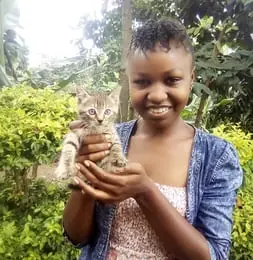
Your cat has scent glands located on its cheeks. When it rubs against your feet, it is transferring its scent on you to:
- Claim ownership of you.
- Tell you it is hungry.
- Affectionately greet you.
If your cat bites, train it to play with toys, and not your body parts.
As cat owners, we are familiar with the greeting that our feline companions receive us with, once we get home. Your cat rubs its head against your feet, then rubs against you with its flank, and finally repeats the action with its tail.
The show doesn’t end there. Your cat looks up to you while meowing, and weaves up its tail against your feet again as it purrs. It’s almost like a ritual.
Cat owners take this behavior an affectionate gesture. Perhaps you respond to this greeting by kneeling and stroking your cat.
Is there another explanation as to why your cat acts this way? Although this is indeed a pleasant greeting, there are other meanings as we shall soon explore.
In this article, I will answer the question as to why your cat loves to rub itself against your feet. Keep reading, to discover the explanation of this habit, and how to bond with your furry friend in the process.
As cat experts explain, here are possible reasons why your cat likes to rub its head, or tail against your feet:
1. Your Cat is Claiming Ownership of You
Scent glands are distributed in various parts of your cat’s body, such as the tail, cheeks, anal areas, and paw pads. When your cat is rubbing itself against you, it is depositing its scent on you.
Scent communication is important when it comes to bonding with your cat. Their scent deposit sticks on your for a long time, and your kitty will use this for long-term communication.
Your cat’s scent on you is a source of comfort for it, they can rest assured that you now identify with it. You now smell like your cat, and that means it has accepted you as part of its tribe.
Rubbing itself against you is a show of affiliation, to maintain a connection between the two of you. Your cat is now claiming ownership of you as one of its belongings.
Your feet are the only part of your body your cat can easily reach, and so it is marking them as theirs.
However, it is not a territorial action. Rather, it is a friendly, relaxing behavior, and the pheromones found in these scent glands can calm a nervous cat.
2. It is a Show of Trust
Most of the feline behaviors have their origins back in their days in the wild. So it would be helpful to put this into consideration when trying to understand your cat’s behavior.
Feral cats rub against each other after a long hunt. Your cat rubs against your feet when you are back to send a similar message; showing that it feels safe in your presence.
It is a positive sign to show that your cat trusts you.
Does your cat weave its tail in between your legs as soon as you arrive from work? An erect tail means that your cat feels happy and confident in your presence.
3. Your Cat is Hungry

If your cat tries to walk around your feet, especially when you approach its food bowl, it could be a sign that it is hungry.
Your cat is excited about feeding time, and it has learned that the behavior of rubbing against your feet, or winding through your legs will help it get what it wants.
You will notice that the rubbing gets more intense as you prepare to feed your cat. Your cat wants to make sure you have its full attention. Think of it as a manipulative act, to get you to give in to its demands.
What you can do
It is important to provide adequate nutrition to your cat, which is at least 240 calories per day. Fill your cat’s bowl with its food in the morning, and place it in an easily accessible area.
The amount of food you feed your cat will often depend on its age, health condition, and the type of food. Talk to your vet to know the right amount of food to give to your cat, and in what quantities.
4. Your Cat is Seeking Information From You

As an olfactory creature, your cat relies on its sense of smell to inform it about its environment.
A friendly cat will rub up against a visitor as a form of greeting, and also to find out information about them. The cat is curious to know where the visitor is coming from, and whether they came across other pets.
Your cat also seeks similar information about you, when you come back home.
Why Cats are Obsessed with Feet
Do you find it weird that your cat goes wild over items such as shoes or socks? Experts have not yet found an answer to this behavior, but what we know for sure is that these intense attractions are normal among our feline friends.
Some cats seem to enjoy chewing or rubbing their faces on socks, shoes, or feet. One possible explanation is that your scent is highly concentrated on your feet, and this scent excites your cat. Your cat uses the scent glands located on its cheeks, to claim ownership of objects.
Another possible reason is that your shoes and shocks capture various smells as you walk on the ground. When you come home and bring in a lot of interesting smells, your cat is curious to know your whereabouts, and if you handled any other pets.
Do You Like Cat Rubs? How to Reinforce the Behavior
When your cat comes up to you and starts rubbing itself against you, pet your cat to reinforce the behavior.
Most cats like to be touched under the chin, at the base of their ears and around their cheeks. When you pet your cat, you transfer your scent back to it, which is something it likes.
Why Your Cat Rubs Against you Then Bites

A moment of your cat rubbing itself against your leg feels good while it purrs, as you feel the silky soft fur on your skin. But it can be startling when your cat sinks its sharp teeth into your ankle.
Why would your cat attempt to bite you while it is rubbing itself against your feet? Here are possible explanations for this seemingly strange behavior.
1. Your Cat is Showing Affection
I know how weird this might sound, but cats bite to show affection. These “love bites” don’t draw blood, and your cat just intends to show its affection for you.
Sometimes a cat will give a gentle, tickling bite to those it loves. This soft biting is different from a real bite when it is hunting.
You can know when it is not a friendly bite by observing your cat’s body language. Check out for offensive posture. If its ears are back, pupils dilated, and it is hissing, then these are signs that your cat is agitated.
2. You Taught it Bad Habits
If you often played with your cat using your hands or feet while it was a kitten, it will continue with the habit even when it grows into an adult cat.
Your cat will try to bite you playfully, not realizing that you might get hurt. Use toys when playing with your cat, such as a string attached to an empty matchbox.
Wherever you notice your cat is in a playful mood, play with it using toys and not your fingers or feet.
3. Your Cat is Frustrated
Your cat bites because it is frustrated at something. It could be that it is hungry, and you just don’t get the message when it rubs itself against you.
We also display this behavior too, when something annoys at, and we vent out our anger through punching something.
4. Your Cat Bites Because it is Acting out of its Hunting Instincts
Cats are natural predators. As one certified behavior consultant says, “A happy cat is one who thinks he has killed something every day.”
Any slight movement of your feet when your cat is rubbing itself against you, might trigger its predatory behavior. That is why cats are excited by playing games that involve pouncing and biting.
Ensure your cat gets at least 10 minutes of predatory play each day.
Conclusion
Cats rely on their sense of smell to find information about their environment. They also use their scents to mark their owners and maintain a connection.
When your cat rubs against your feet, this is often a positive sign to show it is happy to welcome you back home.
It could be also be depositing its scent on you, to mark territory, or claim ownership of you.

Sources
https://www.affinity-petcare.com/en/why-do-cats-rub-against-legs-their-owners
https://www.catster.com/cat-behavior/why-do-cats-rub-against-you-a-weird-cat-behavior-explained
https://www.petmd.com/cat/behavior/cat-behavior-why-do-cats-rub-against-you
https://www.aspca.org/pet-care/cat-care/common-cat-behavior-issues/aggression-cats